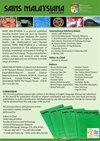Study on Effect of Toluene-Acid Treatments of Recycled Carbon Black from Waste Tyres: Physico-Chemical Analyses and Adsorption Performance
IF 0.8
4区 综合性期刊
Q3 MULTIDISCIPLINARY SCIENCES
引用次数: 0
Abstract
Recycled carbon black (rCB) produced by pyrolysis has a low value because it contains high levels of impurities, such as sulfur, nitrogen, and oxygen. Various treatments have been proposed using chemicals to purify and improve the properties of rCB. In this study, rCB was treated with toluene (rCB-T), followed by subsequent treatment using acids HCl (rCB-T-HCl), HNO3 (rCB-T-HNO3), and HCl-HNO3 (rCB-T-HCl-HNO3). The treated rCB samples were characterized using CHNS analyser, scanning electron microscope, BET analyser, zeta potential, Fourier transform infrared spectroscopy, and Raman spectroscopy. The adsorption of methylene blue dye onto the rCB samples was also investigated to study the effectiveness of the treatments. Treatment with toluene alone was insufficient to increase the carbon content and surface area of the rCB. Subsequent treatment of rCB with acids, especially HNO3, significantly increases the carbon content, surface area, surface functional groups, and surface charge of the rCB. This results in an increased adsorption capacity of the rCB, from 6.04 mg/g to 46.51 mg/g for the rCB-HNO3 and 54.80 mg/g for the rCB-T-HCl-HNO3.废轮胎回收炭黑的甲苯酸处理效果研究:物理化学分析和吸附性能
热解产生的再生炭黑(rCB)价值较低,因为其中含有大量杂质,如硫、氮和氧。人们提出了各种处理方法,利用化学物质来净化和改善 rCB 的特性。在本研究中,先用甲苯(rCB-T)处理 rCB,然后用酸性物质 HCl(rCB-T-HCl)、HNO3(rCB-T-HNO3)和 HCl-HNO3(rCB-T-HCl-HNO3)进行处理。使用 CHNS 分析仪、扫描电子显微镜、BET 分析仪、ZETA 电位、傅立叶变换红外光谱和拉曼光谱对处理后的 rCB 样品进行了表征。为了研究处理方法的有效性,还调查了亚甲基蓝染料在 rCB 样品上的吸附情况。仅用甲苯处理不足以增加 rCB 的碳含量和表面积。随后用酸(尤其是 HNO3)处理 rCB 可显著增加 rCB 的含碳量、表面积、表面官能团和表面电荷。这导致 rCB 的吸附容量增加,rCB-HNO3 和 rCB-T-HCl-HNO3 的吸附容量分别从 6.04 毫克/克和 54.80 毫克/克增加到 46.51 毫克/克和 54.80 毫克/克。
本文章由计算机程序翻译,如有差异,请以英文原文为准。
求助全文
约1分钟内获得全文
求助全文
来源期刊

Sains Malaysiana
MULTIDISCIPLINARY SCIENCES-
CiteScore
1.60
自引率
12.50%
发文量
196
审稿时长
3-6 weeks
期刊介绍:
Sains Malaysiana is a refereed journal committed to the advancement of scholarly knowledge and research findings of the several branches of science and technology. It contains articles on Earth Sciences, Health Sciences, Life Sciences, Mathematical Sciences and Physical Sciences. The journal publishes articles, reviews, and research notes whose content and approach are of interest to a wide range of scholars. Sains Malaysiana is published by the UKM Press an its autonomous Editorial Board are drawn from the Faculty of Science and Technology, Universiti Kebangsaan Malaysia. In addition, distinguished scholars from local and foreign universities are appointed to serve as advisory board members and referees.
 求助内容:
求助内容: 应助结果提醒方式:
应助结果提醒方式:


